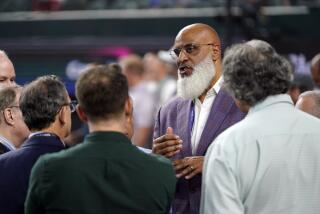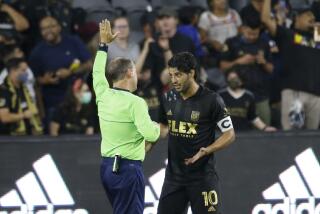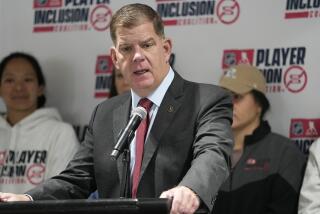NHLPA leader says players union opposes salary rollbacks, strike
- Share via
Donald Fehr, executive director of the NHL Players’ Assn., said Friday the union remains opposed to the league’s proposal that players make significant financial givebacks to promote economic stability among wealthy and have-not franchises in the next collective bargaining agreement and said he can’t answer the obvious question of whether a lockout will occur.
“I wish I knew the answer to that too. I’ve got about 750 guys out there that would like to know the answer to that,” he said during a conference call after the second of four meetings with players.
“All I can tell you and all I can tell the fans is that nobody on the players’ side is talking about stopping the season. Nobody on the players’ side is talking about saying we have negotiations up to a date and then that’s all. I have been in experiences before in which you play without a contract under the old rules and you continue negotiating and try and find a deal.
“And so I think your question needs to be addressed not to me but to the representatives of the owners. We certainly hope there isn’t. We certainly don’t think there’s a reason for it. If they choose to do it, you should understand that it’s something they chose to do.”
The current labor agreement expires Sept. 15 and Commissioner Gary Bettman has said the league doesn’t intend to continue under this agreement. A lockout would be the third imposed by the NHL: The first cut the 1994-95 season to 48 games, and the second wiped out the 2004-05 season.
The next formal negotiations are scheduled for Wednesday, but Fehr said he planned to speak to Bettman this weekend. Fehr also said he’s optimistic that the sides are finding common ground on issues “that are not what you might call the core economic, big-dollar areas.”
The league’s first proposal would redefine hockey-related revenues and reduce the players’ share from 57% to 46%. The NHLPA contends that players would actually get about 43%, essentially repeating the 24% salary rollback imposed at the start of the current deal. The NHL also proposed eliminating salary arbitration and delaying unrestricted free agency until players are in the league for 10 years.
The NHLPA, in what Fehr called an alternate proposal, said players would be willing to forgo some increases tied to revenues for the next three years if owners would expand revenue sharing through an industry growth fund that would assist needy teams. Bettman said Wednesday that “the sides are still far apart and have different views of the world.”
The NHL’s demands for sizable salary givebacks follow similar concessions won by the NFL and NBA in recent labor deals. Fehr said the economics of other leagues vary too widely for the NHL to accept similar terms and noted that baseball alone has enjoyed uninterrupted peace for at least a decade.
Baseball “has no cap. It does have substantial revenue sharing. It has rapidly increasing franchise values, as we’ve seen from a couple of recent sales in Southern California, and it’s completely stable from a labor relations standpoint,” he said, referring to the sales of the Dodgers and the San Diego Padres.
“All the threats of lockouts and shutdowns have come from the cap sports in the last 15 years. And so I understand why they would say that, but we don’t think that merely because another sport does something we should do it in hockey any more than we think because baseball does something we should necessarily do it in hockey.”
twitter.com/helenenothelen
More to Read
Go beyond the scoreboard
Get the latest on L.A.'s teams in the daily Sports Report newsletter.
You may occasionally receive promotional content from the Los Angeles Times.











